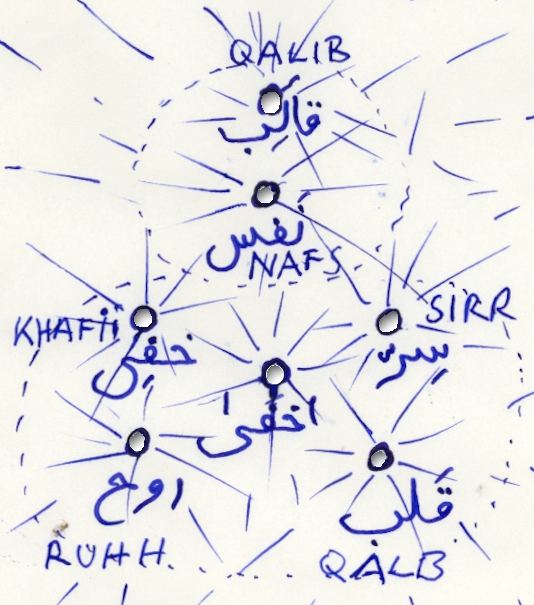Die Latdtaa'if sind sensible Zentren bzw. Türen im Körper, wo
die
Gnadenströme
Allahs
Das Herz ist das erste und auch wichtigste Latdiifah. Der Konzentrationspunkt befindet sich etwa zwei Finger unterhalb der linken Brustwarze, wo sich auch das physische Herz befindet. Qalb steht für Taubah (Umkehr, Reue) und ist speziell mit dem Propheten Adam (alaihi slaam) assozieiert. Für das Ladtaif Qalb ist noch keine Bayjah (Treueversprechen) gegenüber dem Schaikh / Murschid مرشد nötig; für die Aktivierung aller anderen Latdaa'if ist dies aber Voraussetzung. Das Herz ist der Ort des Intellekts, der Bewahrheitung der gesprochenen Worte. Solange sich das Herz nicht im ständigen Dhikru-l-Llah befindet (Wuqūf-i Qalbī), macht es keinen Sinn, sich mit den anderen Ladtaa'if zu beschäftigen. Das physische Herz ist der gefühlte Ort des geistigen Herzens.
Ruuhh ist Geist und das zweite Latdiifah, welches sich etwa zwei Finger unterhalb der rechten Brustwarze.
Diejenigen, welche ihre spirituelle Reise ohne Dhikru-l-llah ohne lebendige Latdaa'if beginnen indem sie zuerst ihre Nafs zuerst besiegen wollen, werden meist hoffnungslos, denn dieser Weg ist sehr schwer. Deshalb heißt es, der Weg der Naqschbandi beginnt dort, wo die anderen Tdaariqas (Turuuq) aufhören, denn der Pfad der Naqshbandi beginnt mit einem Vorgeschmack durch Beleuchtung der Ladtaa'if. Wenn dann das Licht stark genug ist, beginnt der Saalik sich, also die Nafs (Seele) gänzlich Allah zu unterwerfen und zu kontrollieren.
To attend Tadschalli ar-Ruhḥ, (Faidh der Enthüllung von Ruuhh) the Salik needs to achieve the following thirteen.
The following is taken from Session 1 (Faith) of the Anees
ul-Arwah–The Malfuzat of Khwaja Uthman Haruni (rehmatullahi
alyhe)–as recorded by Khwaja Moinuddin Chishti (rehmatullahi
alayhe)
Then the khwaja (master), may God have mercy on him, said “I saw written in the Umdat us-Suluk of Junaid Baghdadi, may God have mercy on him, as related by khwaja Yusuf Chishti, may God have mercy on him, that when Allah, Exalted is He, said “Alastu Bi Rabbikum (Am I Not Your
Lord)”, all the spirits, believer and non-believer,
were immediately divided into four categories:
Those spirits that on hearing their Lord’s call
fell into sajdah (prostration) replying
with heart and limb, “Balaa (Indeed)!”
Those that made sajdah but didn’t do so
with any sincerity.
Those that believed sincerely with their hearts
only.
Those that didn’t care to reply–neither with
heart nor limb.
The khwaja, may God have mercy on him, then
clarified each category.
The spirits that replied Balaa (Indeed You are our Lord and Sustainer!) with heart and limb (in prostration), became Prophets (upon them all be peace), Saints, and sincere believers. The second category that said balaa but without any sincerity are those Muslims who forsake their religion on their death-beds. The third category that said nothing but sincerely meant it are those who were disbelievers but later turned to Islam. The last category who didn’t say anything nor have any sincerity to accept the call are those who live and die as disbelievers.
After articulating all of this, the master became engrossed in his dhikr (remembrance of God) and the one in need of his prayers returned to where he came from–all praises to God for that (lesson). Translated by Sharaaz Khan
http://www.iecrcna.org/site/1379/alastu-bi-rabbikum-am-i-not-your-lord/ |
.

 .
.